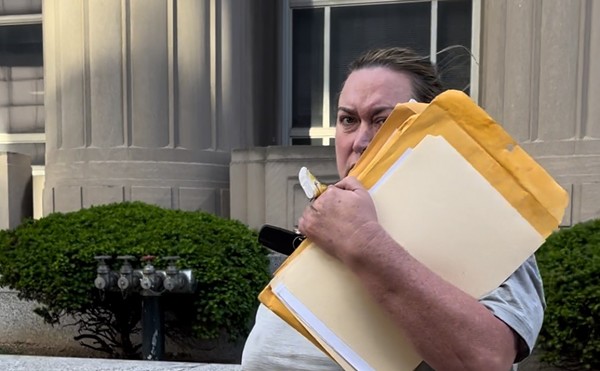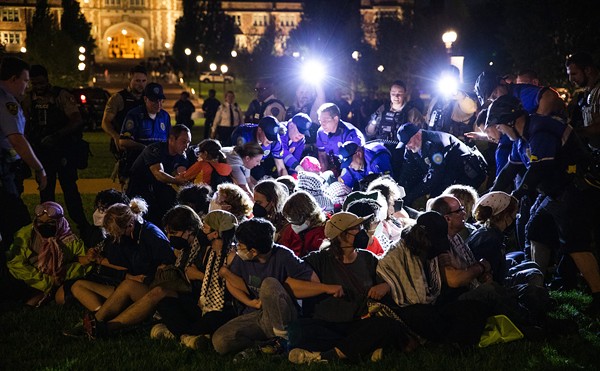The two had dated off and on since their early teens in a small Arkansas town, but marriage wasn't in the cards. Indeed, they broke up during the pregnancy, in no small part -- Smith recalls -- because of his own youth and immaturity.
Nonetheless, the weekend after Makia gave birth to daughter Sarah, Smith says, he drove back to Arkansas from the base at which he was stationed in Oklahoma. His voice shakes when he recalls the feeling of holding his first child.
"I was real excited, even though we weren't married," Smith says. "I was happy and willing to take responsibility."
Smith voluntarily agreed to pay child support, which came directly out of his Army paychecks over the next five years, and though the couple didn't reunite, Smith says, they stayed in close contact, even after he went on a two-year tour in Germany and even after he married another woman and Makia had another boyfriend.
"Makia always sent me pictures of Sarah, and we talked on the phone a lot," Smith says. "I only came back once on leave during that time, but I did get to spend a week-and-a-half with them. We always stayed tight."
By the time Smith came back to the States in December 1995, his marriage was over and he and Makia attempted to resume their relationship. It still wasn't your model family home, mind you -- she was now in St. Louis and he was commuting from the base in Oklahoma every other weekend -- but Smith says Sarah made it worth the effort.
"She meant the world to me and still does," Smith says of the little girl. "She was my first child (he had two others with his wife), and I guess I sort of favored her. Makia and I just spoiled her to death.
"Sarah was like a grownup. She loved new clothes and new stuff. If she went into a store, she just had to have stuff. We couldn't leave the store without getting her some new stuff.
"I just loved being around her. I'd play "the Claw' or some other mean monster, and she'd just laugh and laugh. And we'd go to the movies, skating, bowling, all kinds of stuff. We always had a great time."
Eventually Smith was transferred to the St. Louis area, and the three were able to live together as a family here. Then it was back to Oklahoma in 1997, where there were even plans for a marriage.
But again things fell apart for the couple, and Makia went back to Arkansas with her daughter. This time, it was she who got married and -- according to Smith -- visitations with Sarah were sharply curtailed at the behest of her husband.
Smith, who left the Army and became a car salesman in Oklahoma, also married again. He briefly stopped making formal child-support payments but says he continued to send money for gifts for Sarah.
Then, last spring, Smith received word that Makia was seriously ill and hospitalized. He says he went to Arkansas to get his daughter so that he and his wife could take care of her until Makia got well.
But by the time he arrived, Makia had tragically died of Lyme disease. He was a pallbearer in her funeral.
That night, says Smith, there was an argument with Makia's mother, who is from North County in St. Louis but had gone to Arkansas to care for her daughter. Sarah's grandmother wanted to raise the girl.
"We tried to work it out about five times that night, but we couldn't agree," Smith says. "Finally I just said, "This is my daughter, and I'm taking her with me.' She even tried to call the cops to stop me, but when she told them I was the father, they obviously said there was nothing they could do to me."
Smith and his wife returned to Oklahoma, but not without reservations about taking the child away from her grandmother.
"I lost my own mother when I was in high school, so I could relate to the pain of a child losing her mother," Smith says. "As long as Makia was living, I would have never tried to take her away, but I felt that my wife and I could give her a good home and a better life."
Still, they thought it best to work out an accommodation with Makia's mother, and they agreed she could have Sarah for four weeks when school was out of session. On May 30, they met halfway, in Joplin, and Sarah came back to St. Louis with her grandmother.
Not long afterward, the grandmother filed to adopt Sarah, claiming she was the closest living relative and that she wasn't even sure who Sarah's father was. After legal skirmishing in Oklahoma, the case moved to St. Louis. Smith -- who is listed on Sarah's birth certificate as her father but had no other evidence of his fatherhood -- hired attorney Jack Turcotte, a top family-law specialist in Clayton, to represent him.
A motion for habeas corpus was filed by Smith to have his daughter returned to him. In November, it was ordered that Smith take a DNA test. Smith says he was relieved.
"I said, "Let's get this over with so my daughter can be home for Christmas,'" Smith tells me. "I just wanted to get it done."
But then came the bad news: The DNA test showed that Julius Smith was not Sarah's father.
Case closed. After nearly six years of what he thought was fatherhood and thousands of dollars in child support and legal fees, Smith didn't have a legal leg to stand on. He was just an unrelated guy.
"It broke my heart in the worst way," Smith says. "I just couldn't believe it. I wouldn't have thought it in a million years. I went home and sobbed.
"It wasn't about the money or that Makia would have lied to me. I just feel so much remorse for Sarah because I've been the only real father in her life."
Was the "best interest of the child" served here? No outsider knows. It's entirely possible that the little girl will be better off in St. Louis with her grandmother (whose identity, along with Sarah's, we've protected) than she would have been with Smith. But maybe she won't be.
But this story isn't about who deserved custody: It's about how you just never know.
There won't be any demonstrations as in the case of a more famous 6-year-old who lost his mother, Cuban-born Elian Gonzalez. This isn't a contentious grandparents'-rights case like the one raging over Jenna Mehring in Columbia, Ill.
It's just a story of humans and their ironies.
For Julius Smith, there are no more child-support payments required for Sarah, but he says he'd still like her to share in a college fund to which he says he contributes monthly for her and his two children. He adds:
"I'd still take her back any day and raise her as if nothing happened."





